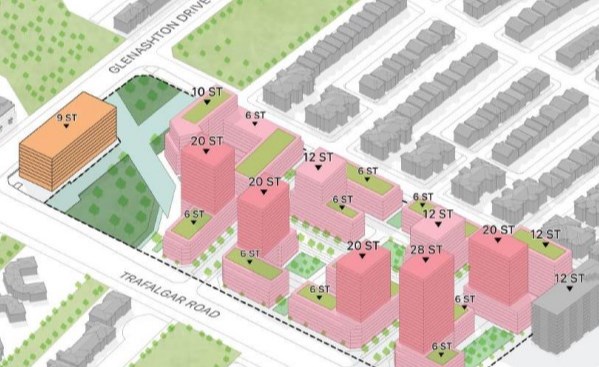
Town-owned development agency pushes condo projects on surplus lands, sparking debate over growth, traffic and transparency
The town is looking at a plan to build more than 2,600 new residential units in about a dozen buildings, ranging from six to 28 storeys, on its former Trafalgar Road public works site just south of Dundas Street.
The vacant 15-hectare site would be divided into five development blocks, with new roads, commercial space, a park near Glenashton Drive, and 100 units of affordable housing.
Located in one of Oakville’s fastest growing areas, critics worry the density of the proposed development would exacerbate Trafalgar Road traffic woes, add to overburdened schools and offer little benefit to the community.
An online petition has been signed by nearly 900 people as of late August and several residents voiced concerns directly to town council on June 16.
Their fears – traffic, density, and overdevelopment – echo those of residents across Oakville facing other large-scale projects.
What is different?
While the concerns may sound familiar, this development stands apart in one crucial way.
Unlike most proposals that come from major private developers, this plan comes from the Oakville Municipal Development Corporation (Oakville MDC) – the town’s fully-owned development arm.
Created in 2018, the Oakville MDC’s goal is “to undertake development initiatives to unlock the value of the town’s under-utilized, surplus real estate holdings and to maximize the financial return that these lands can generate.”
The town-owned agency acts as a “master developer,” shepherding the lands through the planning process, then eventually selling the property and its approved plan to an interested developer.
For Ward 5 councillors Jeff Knoll and Marc Grant, the model provides certainty that key details of the public works development will remain in the town’s control.
In typical planning applications, councillors face the looming threat of an appeal to the Ontario Land Tribunal if they don’t move the approval process forward within a set time frame.
At the June 16 meeting, Knoll reassured residents that there is plenty of time to listen to the community and understand local needs before moving ahead with development.
Having Oakville MDC as a master developer ensures the town will get what it wants from the project, added Grant. “I think that’s something really key that we can’t lose sight of.”
How did the town become a land developer?
Mayor Rob Burton says the town’s redevelopment of the public works site can be traced back to a meeting shortly after he was elected mayor.
At that time, the property had been sold to a major development company. It had permission to build a certain number of units but wanted to add more.
When the developer refused to pay more for additional units, the deal collapsed. That’s when Burton says he realized Oakville could “make a lot more money if it was its own land developer.”
“People hate to pay property tax, maybe it’s a good idea to maximize other forms of revenue,” he said.
The result was the eventual creation of Oakville MDC, which is led by a five-member board of directors. Burton chairs that board, which includes Town of Oakville CAO Jane Clohecy, as well as three citizen appointees.
According to the Oakville MDC website, the upside of a development corporation is that it offers the town the ability to “respond to and negotiate with the private sector outside of the political process.”
It adds that because it can enter partnerships, joint ventures and other commercial relationships with builders and developers, it’s able to “maximize the absolute value of the town’s landholdings and to generate a long-term revenue stream to the town.”
One example currently in the works is the town’s former fire hall property at Randall and Navy Streets.
Oakville MDC is currently evaluating joint venture proposals to redevelop the property into a 17-storey condo, with the two bottom floors to be owned by the town.
Read more here: Could a 17-storey condo be coming to the corner of Randall and Navy?
Different rules around transparency
Flexibility is a key upside of a municipal services corporation like Oakville MDC, says Jason Reynar, a lawyer and partner at the Toronto law firm Lerners.
Not only can it do business differently, it is not legally required to follow the same regulations as the municipality with regard to open meetings or even freedom of information rules.
“Where I’ve seen challenges with these sorts of corporations is around a lack of transparency, a lack of communication or a perceived lack of accountability,” said Reynar.
“The ones that are really successful are usually really good at communicating to the public or back to the shareholder or municipal council.”
Although the town is loaning nearly $3 million to cover administrative and project costs, little is publicly available about the MDC’s operations beyond a basic website.
There are no records or minutes of meetings and no opportunity for public input into the organization’s process. Reports to town council offer only very basic overviews of upcoming plans.
Its 2024 Annual Report does offer 11 pages of overview on its plans, but a 2025-2028 business plan referred to multiple times in the document and during a recent report to town council, will not be made public.
It’s a circumstance that has led the Oakville Community Association (OCA) to call for better town-wide representation on the Oakville MDC board.
It wants to see a member from each of the town’s seven town wards appointed to by the board by town council, to ensure the agency can “represent the interests of all Oakville residents.”
Burton dismisses that suggestion, noting, “They’re entitled to their opinion. Council and I have chosen a different vision.”






